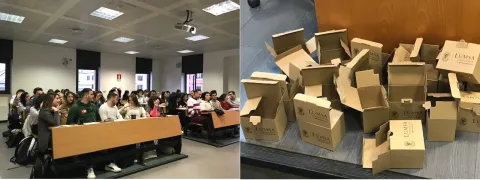
It is a multidisciplinary course of 40 hours in English - 6 ECTS
Better regulation is a key challenge for public authorities working at International, European, National and sub-national level if they want to reaffirm their legitimacy in the face of citizens and re-build public trust. With the present course, the student learn how to improve the quality and the impact of regulation. The students learn how to analyze and implement a regulatory process in all its steps: from the analysis of the problem to the tailoring of the most appropriate regulatory response, and to the ex-post impact analysis. A particular focus will be devoted to the new developments of behavioral regulation: the new discipline that studies how regulation should respond to the cognitive distortions that are widely studied in economics, psychology, and neurosciences.
The course is open to all students with different backgrounds (law, economics, political sciences, languages, psychology) enrolled in undergraduate or master programs.
Interactive lessons and activities. Students take part in interactive lessons and activities. Their evaluation will contribute to increasing the final mark up to 10 additional points.
- Regulatory clinic. The class will take part in real consultation processes. For instance, in 2017 and 2020, all students were asked to answer on-line consultation launched by the Italian Senate concerning draft guidelines for consultation and by the department of PA of the presidency of the Council of Ministries on the same topic respectively. In 2018-2019, students participated in two other consultations on public procurement launched by the Ministry for infrastructures and transports.
- Study visits to the Italian Senate and to the Chamber of Deputies (depending on the health situation). In the regulatory clinic framework, some exercises will be performed during the two study visits to the Italian Parliament. Here students will be confronted with specific problems related to law-making (e.g. drafting, or consistency of a given rule with European or constitutional principles).
- Flipped classrooms. Students organised in small groups can prepare a lesson on the materials provided by the professor and give a class presentation. The flipped classroom is intended to improve the ability to interact in interdisciplinary groups and to clearly expose the learning outcomes.
- One minute paper. At the end of a class, students could be asked to fill a "1-Minute Paper": students must organize their thinking on the class’s major points. This exercise is not a simple list of topics covered during class but it must be a concise summary of the class itself.
- In-class exercises. Students can also be exposed to questions or can be asked to solve problems related to major class topics within 30 mins
Internship (optional). Students with a regular attendance to the EU Approach to Better Regulation are eligible to carrying out an internship starting after the end of the class in an institution involved in better regulation (regulator, regulated firm or think tank), where the students’ knowledge might be implemented in order to approach concrete regulatory problems. The amount of CFU recognised -from 3 to 6 CFU- is related to the number of internship hours carried out. A list of institutions and organisations involved is regularly updated and uploaded on the website of the course https://betteregulation.lumsa.it/eu-approach-better-regulation/internship
Materials. The course is supported by an advanced interactive platform (FAD), that enables lessons in remote classrooms, as well as the downloading of recorded video lessons and materials. Under request, additional basic readings are provided to those who do not have an adequate background to follow the course (e.g. Language students). An open web site provide a wide selection of documents (https://betteregulation.lumsa.it/publications/documents), academic papers on better regulation (https://betteregulation.lumsa.it/publications/literature), and link to institutions, think tanks, journals, associations, universities.
It is the first time that a similar course has been proposed in an Italian or European university
Submitted on Mon, 10/12/2020 - 14:07

